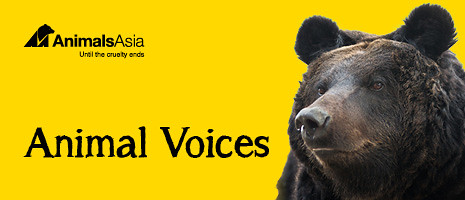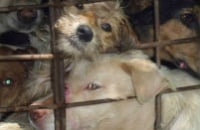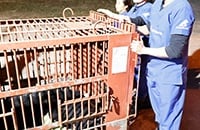Sledgehammer slaughter was a wake up call for Vietnam
17 July 2015

The revelation that Australian-bred cattle was slaughtered by sledgehammer in Vietnam rightly outraged many across the world. The international demand to end exports to Vietnam could well turn out to be the wake-up call the country needs to implement its first animal welfare laws says Animals Asia’s Animal Welfare Officer in Vietnam Nguyen Tam Thanh.
The speed of Vietnam’s development since the mid-80s has been nothing short of break-neck.
People’s way of life has been altered dramatically by the opening up of the economy and the changes have affected everything from the way we shop to the way we think.
Inevitably, such hyper-accelerated change has lead to difficulties as the country’s laws struggle to keep up with both changes in societies’ views, and Vietnam’s place in a globalised world.
On occasions Vietnam has made headlines abroad for all the wrong reasons – particularly for animal cruelty. Revelations over the way cattle - exported live from Australia - were being slaughtered was just the latest example.

If we must use animals as a food source, then the least we can do is ensure to the best of our abilities that the animals do not unduly suffer stress or pain at any stage of the process. Clearly, the slaughter method above fails to achieve this goal.
Yet, there is very little the Vietnamese authorities can presently do to stop a repeat of the scandal, as the country has no animal welfare laws yet.
As Vietnam has now joined the community of nations economically, it is time for the country’s laws to catch up with its more developed peers and the morality of its own people. Make no mistake, the vast majority of Vietnamese are as appalled as the average Australian at the sight of an animal being so cruelly slain.
If our neighbours like Thailand and Singapore can build and enforce animal welfare laws on the rearing, transport and slaughter of animals, then Vietnam – as a middle income country since 2010 – certainly can too.
The positive we can take from the latest animal cruelty outrage is that it looks set to accelerate the introduction of the first animal welfare legislation in Vietnam.
Thankfully, a draft law including provisions on the humane treatment of animals during rearing, scientific research and slaughter for consumption has been submitted to the National Assembly for debate and could well become a reality later this year.
Such legislation won’t solve Vietnam’s animal welfare troubles overnight but it will allow the government to stamp out the worst offences and send a clear signal that the country does not condone animal cruelty.
Vietnam’s economy remains heavily dependent on agriculture, while tourism is also a vital sector. Without animal welfare legislation, both will suffer in the near future.
As animal welfare awareness both within the country and worldwide is expanding, Vietnam’s laws can’t afford to lag behind much longer if it wants to remain a welcome and contributing member in the global economy.
BACK





 5 reasons the dog meat trade must end
5 reasons the dog meat trade must end
 New year, new home for Christmas the Bear!
New year, new home for Christmas the Bear!
 Veterinary welfare training – pain management
Veterinary welfare training – pain management